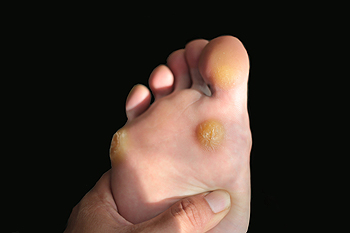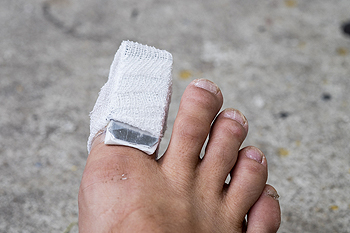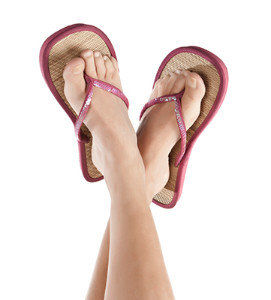Webster (281) 316-3338
Alvin (281) 331-3525
Webster (281) 316-3338
Alvin (281) 331-3525
 Plantar warts are bumps that form on the feet from the HPV virus. Plantar warts may be painful, and are typically contracted in places such as public swimming pools or gyms. There are various treatment options for this condition. The goal is to irritate the bump so your own immune system can attack it. On your own, you could buy salicylic acid or apple cider vinegar and apply it to the warts. Another at-home remedy is leaving a piece of duct tape on the wart, and pulling it off after a few days. If these options do not work, or if you want the warts gone quickly, you can see a podiatrist. The doctor can freeze, burn or cut the lesion, in order to initiate an immune system response. If your plantar warts are bothering you, or if you are not sure what the bumps on your feet are, be sure to see a podiatrist.
Plantar warts are bumps that form on the feet from the HPV virus. Plantar warts may be painful, and are typically contracted in places such as public swimming pools or gyms. There are various treatment options for this condition. The goal is to irritate the bump so your own immune system can attack it. On your own, you could buy salicylic acid or apple cider vinegar and apply it to the warts. Another at-home remedy is leaving a piece of duct tape on the wart, and pulling it off after a few days. If these options do not work, or if you want the warts gone quickly, you can see a podiatrist. The doctor can freeze, burn or cut the lesion, in order to initiate an immune system response. If your plantar warts are bothering you, or if you are not sure what the bumps on your feet are, be sure to see a podiatrist.
Plantar warts can be very uncomfortable. If you need your feet checked, contact Dr. Douglas Webb from Texas. Our doctor will assist you with all of your foot and ankle needs.
About Plantar Warts
Plantar warts are the result of HPV, or human papillomavirus, getting into open wounds on the feet. They are mostly found on the heels or balls of the feet.
While plantar warts are generally harmless, those experiencing excessive pain or those suffering from diabetes or a compromised immune system require immediate medical care. Plantar warts are easily diagnosed, usually through scraping off a bit of rough skin or by getting a biopsy.
Symptoms
Treatment
To help prevent developing plantar warts, avoid walking barefoot over abrasive surfaces that can cause cuts or wounds for HPV to get into. Avoiding direct contact with other warts, as well as not picking or rubbing existing warts, can help prevent the further spread of plantar warts. However, if you think you have developed plantar warts, speak to your podiatrist. He or she can diagnose the warts on your feet and recommend the appropriate treatment options.
If you have any questions please feel free to contact one of our offices located in Alvin and Webster, TX . We offer the newest diagnostic and treatment technologies for all your foot and ankle needs.
 The toes play a significant role in maintaining balance in the body while standing, in addition to pursuing walking and running activities. The bones are small, and can easily break if something heavy is dropped on one of them, or if it bangs against a piece of furniture. There are noticeable symptoms of a broken toe. These often consist of immediate pain, discomfort, redness, and the affected area may appear to be bruised and swollen. Research has shown there are several different types of breaks. A traumatic fracture consists of a sudden break, and this can occur from falling, or severely stubbing the toe. Additionally, if extended periods of time are spent in running activities, the toes may endure stress fractures. This can be a result of a gradual weakening of the bones in the toes. A fracture is considered to be severe if a bone is protruding from the skin, and an infection may occur from the open wound. If you have broken your toe, it is suggested to seek the counsel of a podiatrist who can properly diagnose and treat this condition.
The toes play a significant role in maintaining balance in the body while standing, in addition to pursuing walking and running activities. The bones are small, and can easily break if something heavy is dropped on one of them, or if it bangs against a piece of furniture. There are noticeable symptoms of a broken toe. These often consist of immediate pain, discomfort, redness, and the affected area may appear to be bruised and swollen. Research has shown there are several different types of breaks. A traumatic fracture consists of a sudden break, and this can occur from falling, or severely stubbing the toe. Additionally, if extended periods of time are spent in running activities, the toes may endure stress fractures. This can be a result of a gradual weakening of the bones in the toes. A fracture is considered to be severe if a bone is protruding from the skin, and an infection may occur from the open wound. If you have broken your toe, it is suggested to seek the counsel of a podiatrist who can properly diagnose and treat this condition.
Broken toes may cause a lot of pain and should be treated as soon as possible. If you have any concerns about your feet, contact Dr. Douglas Webb from Texas. Our doctor will treat your foot and ankle needs.
What Is a Broken Toe?
A broken toe occurs when one or more of the toe bones of the foot are broken after an injury. Injuries such as stubbing your toe or dropping a heavy object on it may cause a toe fracture.
Symptoms of a Broken Toe
Although the injured toe should be monitored daily, it is especially important to have a podiatrist look at your toe if you have severe symptoms. Some of these symptoms include worsening or new pain that is not relieved with medication, sores, redness, or open wounds near the toe.
If you have any questions, please feel free to contact one of our offices located in Alvin and Webster, TX . We offer the newest diagnostic and treatment technologies for all your foot care needs.
 Many people enjoy the ease of wearing flip-flops. They are a simple shoe, easy to wear, and designed in a variety of colors. Despite their popularity, there are foot conditions that can develop from wearing this type of shoe. Ligaments and tendons may slowly pull out of alignment, and a bunion can form. Additionally, if there is little or no arch support, this may trigger the onset of heel pain, which could be indicative of plantar fasciitis or heel spurs. Many flip-flops are constructed of a porous material, and this can be the perfect area for fungus to grow. This can lead to athlete’s foot and toenail fungus. If flip-flops are frequently worn, hammertoe can develop as a result of the toes grasping the shoe to stay on the foot. If you would like additional information about the consequences of wearing flip flops, please consult with a podiatrist.
Many people enjoy the ease of wearing flip-flops. They are a simple shoe, easy to wear, and designed in a variety of colors. Despite their popularity, there are foot conditions that can develop from wearing this type of shoe. Ligaments and tendons may slowly pull out of alignment, and a bunion can form. Additionally, if there is little or no arch support, this may trigger the onset of heel pain, which could be indicative of plantar fasciitis or heel spurs. Many flip-flops are constructed of a porous material, and this can be the perfect area for fungus to grow. This can lead to athlete’s foot and toenail fungus. If flip-flops are frequently worn, hammertoe can develop as a result of the toes grasping the shoe to stay on the foot. If you would like additional information about the consequences of wearing flip flops, please consult with a podiatrist.
Flip-flops are not always the best choice of footwear. If you have any concerns about your feet or ankles, contact Dr. Douglas Webb from Texas. Our doctor will assist you with all of your foot and ankle needs.
Flip-Flops and Feet
When the weather starts warming up, people enjoy wearing flip-flops. Flip-flops are comfortable, stylish, and easy to slip on and off; they're perfect for any summer beach goer. However, these shoes can cause harm to the feet.
How Can Flip-Flops Affect Me Long-Term?
Are There Injuries Associated with Flip-Flops?
Yes. Since flip-flops are relatively weak and do not provide the same amount of support as sneakers, people who wear flip-flops regularly are more susceptible to injuries. On top of that, the open nature of the shoe makes your feet more prone to other problems, such as cuts and even infections. Common injuries and ailments include:
I like Wearing Flip-Flops. Are There Safe Alternatives?
When buying flip-flops, try to find ones that have sturdy soles and that are made of high-quality materials that will support for your feet. These flip-flops will cost more but will also last longer as a result.
If you have any questions please feel free to contact one of our offices located in Alvin and Webster, TX . We offer the newest diagnostic and treatment technologies for all your foot and ankle needs.
 Pregnant women notice there are many changes that occur to their bodies, and these often include differences in the feet. Foot pain is a common complaint, and it may result from having flat feet. This happens to the feet as the mother-to-be gains weight from the growing fetus. Additionally, swollen feet is a common ailment among pregnant women, and this condition can produce severe discomfort. Mild relief may be found when the feet are elevated, and salt intake is reduced. Ingrown toenails may form during pregnancy, as a result of possible changes in the shape and size of the nail. It is important to moisturize the feet daily, as this often helps in preventing cracked heels from developing. If you would like additional information about how pregnancy affects the feet, it is suggested to consult with a podiatrist who can answer any questions you may have.
Pregnant women notice there are many changes that occur to their bodies, and these often include differences in the feet. Foot pain is a common complaint, and it may result from having flat feet. This happens to the feet as the mother-to-be gains weight from the growing fetus. Additionally, swollen feet is a common ailment among pregnant women, and this condition can produce severe discomfort. Mild relief may be found when the feet are elevated, and salt intake is reduced. Ingrown toenails may form during pregnancy, as a result of possible changes in the shape and size of the nail. It is important to moisturize the feet daily, as this often helps in preventing cracked heels from developing. If you would like additional information about how pregnancy affects the feet, it is suggested to consult with a podiatrist who can answer any questions you may have.
Pregnant women with swollen feet can be treated with a variety of different methods that are readily available. For more information about other cures for swollen feet during pregnancy, consult with Dr. Douglas Webb from Texas. Our doctor will attend to all of your foot and ankle needs.
What Foot Problems Can Arise During Pregnancy?
One problem that can occur is overpronation, which occurs when the arch of the foot flattens and tends to roll inward. This can cause pain and discomfort in your heels while you’re walking or even just standing up, trying to support your baby.
Another problem is edema, or swelling in the extremities. This often affects the feet during pregnancy but tends to occur in the later stages.
How Can I Keep My Feet Healthy During Pregnancy?
If you have any questions please feel free to contact one of our offices located in Alvin and Webster, TX . We offer the newest diagnostic and treatment technologies for all your foot and ankle needs.
 Many people suffer from heel pain, including people who are obese. Mild relief may be found when exercises and foot stretches are frequently performed. People who are overweight may have challenges in practicing a regular exercise regime, and this may be a result of the additional weight the body endures. There are aerobic exercises that can be performed, which can aid in weight loss. If traditional forms of exercise are difficult to partake in, there are other methods to accomplish a weight loss goal. These can include cycling and swimming. Additionally, it is helpful to reduce the amount of calories that are eaten, as this can be beneficial in attaining exercise goals. If you are overweight and experiencing heel pain, it is suggested to consult with a podiatrist who can guide you toward relief.
Many people suffer from heel pain, including people who are obese. Mild relief may be found when exercises and foot stretches are frequently performed. People who are overweight may have challenges in practicing a regular exercise regime, and this may be a result of the additional weight the body endures. There are aerobic exercises that can be performed, which can aid in weight loss. If traditional forms of exercise are difficult to partake in, there are other methods to accomplish a weight loss goal. These can include cycling and swimming. Additionally, it is helpful to reduce the amount of calories that are eaten, as this can be beneficial in attaining exercise goals. If you are overweight and experiencing heel pain, it is suggested to consult with a podiatrist who can guide you toward relief.
Obesity has become very problematic at this point in time and can have extremely negative effects on the feet. If you’re an obese individual and are concerned about your feet, contact Dr. Douglas Webb from Texas. Our doctor can provide the care you need to keep you pain-free and on your feet.
Obesity and Your Feet
Since your feet are what support your entire weight when standing, any additional weight can result in pain and swelling. Being overweight is one of the main contributors to foot complications.
Problems & Complications
Extra Weight – Even putting on just a few extra pounds could create serious complications for your feet. As your weight increases, your balance and body will shift, creating new stresses on your feet. This uneven weight distribution can cause pain, even while doing the simplest tasks, such as walking.
Diabetes – People who are overweight are at serious risk of developing type-2 diabetes, which has a drastic impact on the health of your feet. As you get older, your diabetes might worsen, which could lead to loss of feeling in your feet, sores, and bruises. You could also become more prone to various infections.
Plantar fasciitis – Pressure and stress that is placed on muscles, joints, and tendons can trigger plantar fasciitis, which is an inflammation of tissue that forms along the bottom of the foot.
If you have any questions please feel free to contact one of our offices located in Alvin and Webster, TX . We offer the newest diagnostic and treatment technologies for all your foot and ankle needs.
Read more about How Obesity Affects Your Feet